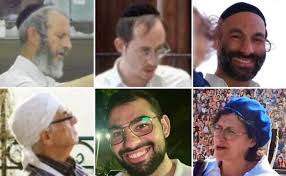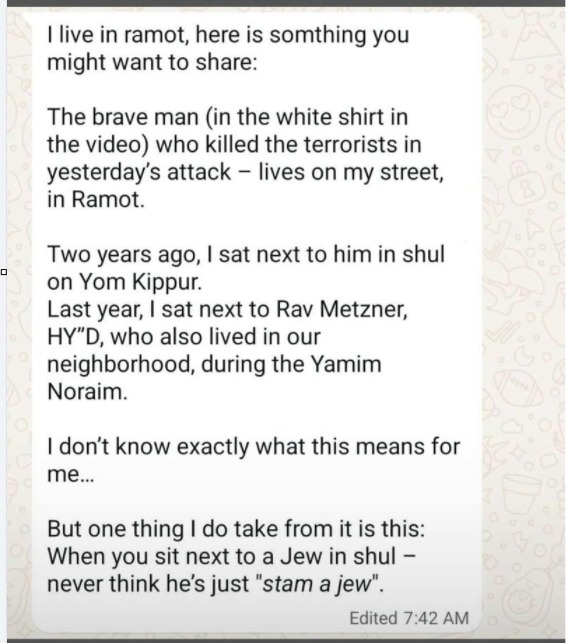September 9, 2025|ט"ז אלול ה' אלפים תשפ"ה Who is Sitting Next to You?
Print Article
Our hearts were broken by the news that two evil terrorists indiscriminately opened fire on a crowd of innocent people waiting at a bus stop in Yerushalayim earlier this week. The lives of the family members of the six beautiful souls (in addition to 4 precious solders) who were murdered will forever be different, and the futures of the twelve people who were wounded—six of them seriously—are forever changed.
The scene was horrific, filled with panic, dread, sadness, and grief. The wicked terrorists who perpetrated the atrocity, and the organization and society that sent and applauded them, were successful in casting a shadow of darkness not only over that intersection, but in truth, over all Israel. The central victims of this event were of course the kedoshim who were murdered, those injured, and those directly in harm’s way that day. But in truth, all of Israel became victims of terror that day and beyond. The goal of terrorists and terrorism is to terrorize. Two of my daughters in Israel called me that day, worried about taking the bus. They, and nearly ten million people, are now (or, in some cases, once again) looking over their shoulders, increasingly mindful of their surroundings, braced for what to do if an attack occurs.
If you look at that scene, you see darkness, hate, and evil. But if you look closer, you can also find light, love, and goodness. Naturally, countless people ran away from the scene, fleeing for their lives. But, as is often the case in Israel, several ran toward the gunmen, risking their lives in an effort to protect total strangers. Indeed, many lives were saved because an IDF soldier from Chashmonaim and an armed civilian were successful in neutralizing the perpetrators before they could claim more lives. While understandably most people were focused on saving themselves, one particular taxi driver could be seen ignoring bullets being shot mere steps from him while helping an elderly woman exit his cab and get out of harm’s way.
A day after the attack, I saw a message from someone who lives near where the attack occurred that left me deeply moved:

People will sometimes refer to themselves as “stam a Jew, just a simple Jew.” There is no such thing as “just a Jew.” Every person you encounter carries an entire world within them, a unique mission, an irreplaceable neshama, and a story, a history, and a destiny only Hashem fully knows. If you knew that in the coming year the person you were sitting next to would be murdered, would you not cherish him a bit more? If you knew that in the coming year the person you were sitting next to would display heroic courage and save countless lives, would you look at him the same way?
As we prepare for the Yamim Noraim, it’s natural to become absorbed in ourselves—our situation, our status, our tefillos, and our success. We open our selichos or machzor, look down at the words, and focus on our personal struggles, our hopes, our fears. These are important concerns that deserve our heartfelt prayers. But the Yamim Noraim are not meant to be experienced in a silo. They are not private retreats of the soul; they are communal pleadings of Am Yisrael standing together before our Father in Heaven.
The great Rosh Yeshiva of the Mir Yeshiva, R’ Nosson Tzvi Finkel zt”l, was once asked by a student on Rosh Hashana what he should prioritize in his davening. Success in Torah? Good health? A proper shidduch? What is the most important thing to daven for? The Rosh Yeshiva answered him with two words: “Someone else.”
When you sit in shul this Rosh Hashana and Yom Kippur, take a moment—not to interrupt your davening, but to expand it. Look around. Who is sitting next to you? Who is behind you? Who is in front of you? Don’t assume you know their story. That elderly man may have carried the weight of unimaginable suffering and still comes faithfully to minyan. That young father may have risked his life to protect others. That quiet neighbor may be enduring an invisible struggle you can’t see.
The person beside you is not “stam a Jew.” He or she is a precious child of the Ribbono Shel Olam, with infinite worth and unique greatness.
So as you pour out your heart in prayer, include them. Daven not only for yourself and your family, but for the family sitting two rows behind you, for the widower across the aisle, for the single struggling mother, for the child fidgeting beside you. And just as importantly, trust that they are davening for you, too.
This year, may we enter the Yamim Noraim with the awareness that there is no such thing as “stam a Jew.” Every Jew is extraordinary. Every Jew is worth knowing, worth caring about, and worth davening for. And when we recognize that—when we see the greatness and holiness in each other—then perhaps Hashem will see the greatness and holiness in us all, and inscribe us together for a year of blessing, health, and peace.






